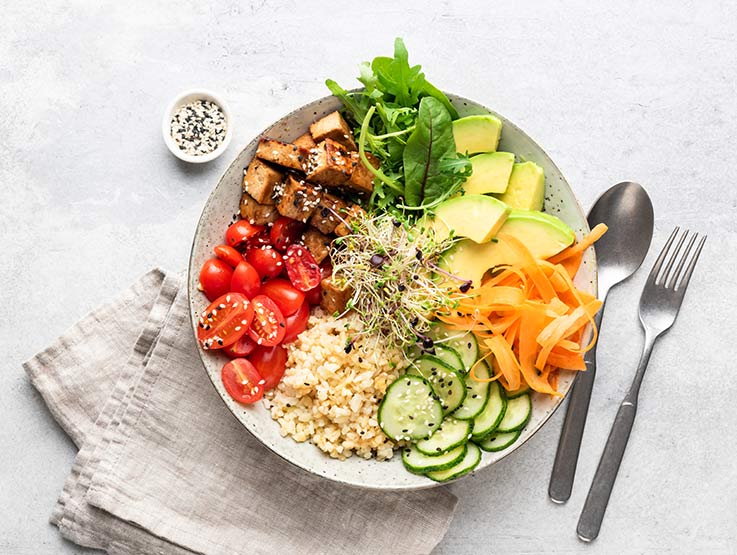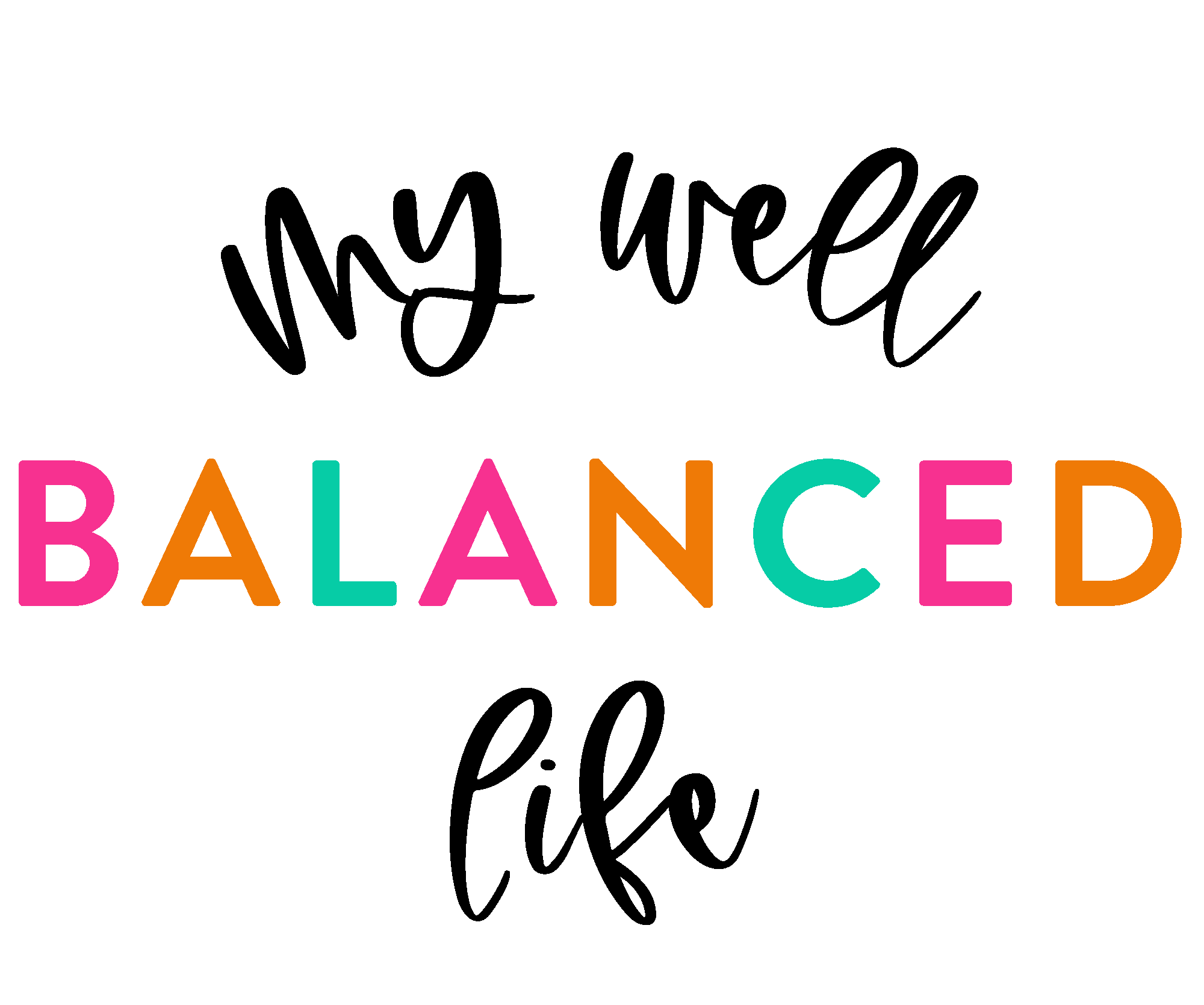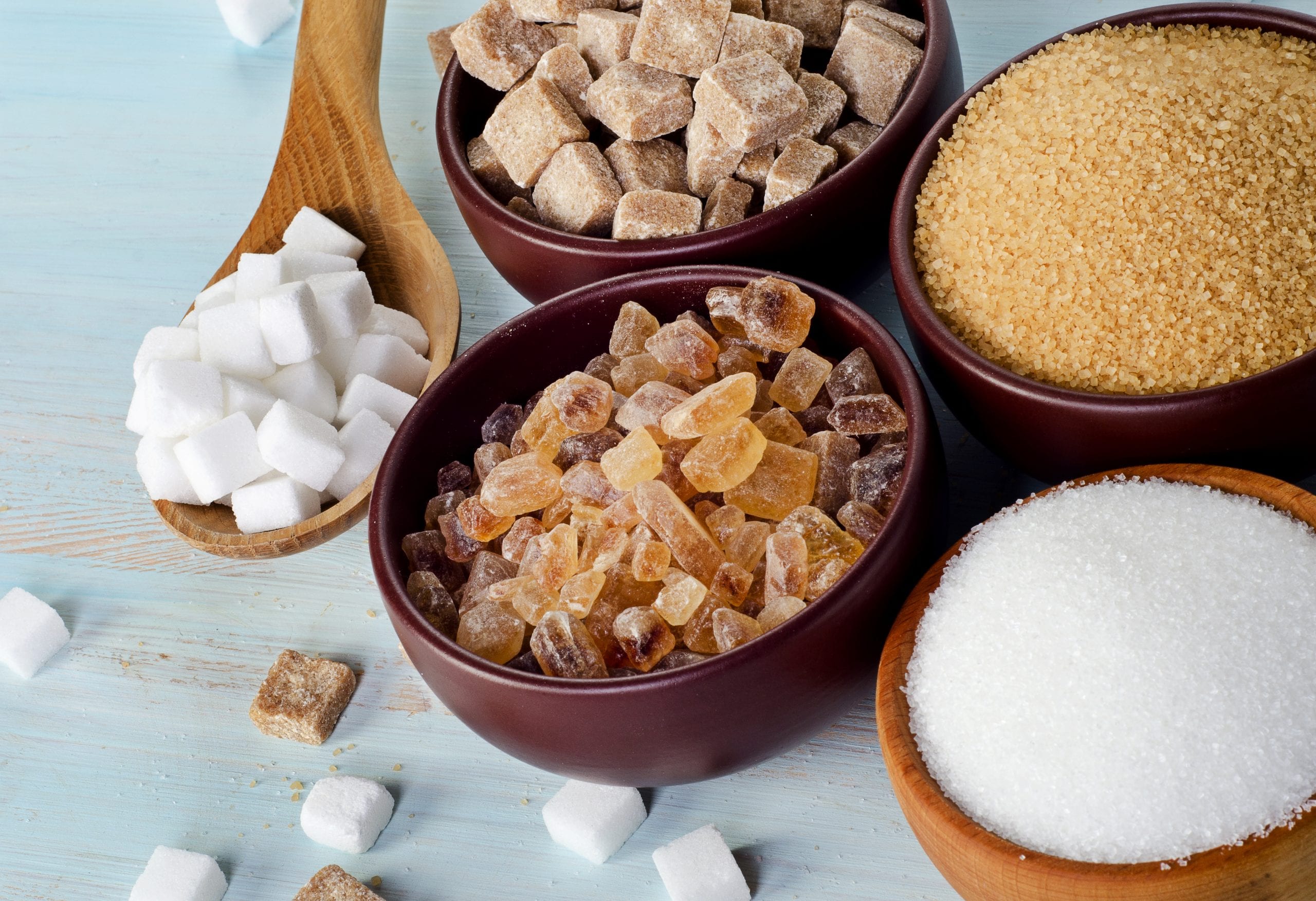Before we start chatting about ways to regulate your blood sugar, let’s just talk about sugar. Mmmm, sugar.
When was the last time you bought sugar? You know, the pretty white crystals that you love to put in your coffee or sprinkle on top of your bowl of cereal. Or to bake those cookies your family loves so much. Yum.
Just take a second to think about the typical five-pound bag of sugar that sits on the shelves at your local grocery store. Now think about 30 bags of that sugar. That’s a lot of sugar, y’all. Can you imagine eating ALL of that sugar? Surely not. Well guess what, you guys? Americans eat an average of 150 pounds of sugar each year. Each one of us plows through 30 five-pound bags of sugar in 365 days. Or 150 one-pound bags. Yikes!

Blood sugar disregulation is an epidemic in this country, and it is a safe bet to state that every single one of us has some level of it. And even though sugar (and processed foods which contain all sorts of hidden sugars) is obviously the main culprit, other factors play into our levels of blood sugar. So what can we do to prevent ourselves from becoming one of the growing statistics of people diagnosed with one of the many blood sugar disorders (hypoglycemia, insulin resistance, and diabetes… to name a few)?
What Is Blood Sugar And How Does It Work?
We talk about blood sugar a lot, but most of us don’t really know how it works. So let’s start with a very brief overview.
When we eat, our bodies begin to break down our food, and the carbohydrates are broken down into glucose. The presence of glucose in the bloodstream triggers the pancreas to release the hormone insulin, and this insulin shuttles the glucose into the cells for energy. Any excess glucose is stored in the liver for later use.
When blood sugar levels are on the low side between meals or while we are sleeping, another hormone called glucagon is released and the liver releases glucose to bring blood sugar levels back up to homeostasis. So both the liver and the pancreas are involved in keeping your blood sugar levels stable. In an ideal case, the pancreas and liver are able to do the job of blood sugar regulation without having to call upon any other organs of the body.
However, this ideal situation is far from common for most people. When things start to go south, the adrenals join the party. But then the adrenals, which are only supposed to be used in emergency situations, get called upon for help on a regular basis. This becomes a vicious cycle and these three organs get so worn out that disease occurs.

7 Things To Help Regulate Your Blood Sugar Levels
So what can we do about it? The good news is there are things you can do TODAY to help your body do right by blood sugar.
Get rid of the processed foods.
Take one look at the ingredient label on any package of processed food and you are sure to find sugar disguised with fancy, hard-to-pronounce words. And I’m not just talking about the crappy brands, this goes for those “healthy” and “gluten-free” brands, too.
You may think you’re not eating tons of sugar, but if your diet is heavy in processed and packaged foods then you are deceiving yourself. And if it’s low-fat or fat-free, then I can guarantee you that “food” is filled with sugar. When fat is taken out of a food, sugar and sugar substitutes are put in to make up for the taste that is lost when fat was eliminated. Not to mention that you are depriving yourself of countless nutrients when you eat food that has been over processed to fit into a box that can sit on a shelf for years.
(And this is why the 90’s were a hot mess for me. Fat-free/low-fat/non-fat crap wrecked my hormones, destroyed my hair, and had me carrying around at least 10 pounds of extra weight. But at the time I thought I was being healthy! All we can do is learn and do better.)
Use the 40/30/30 principle for meals and snacks.
It is SO important to work on incorporating the proper balance of fats, proteins and carbohydrates into the diet. The general breakdown is 40% carbohydrates, 30% fat, and 30% protein, though each person needs to find their happy place with these percentages.
Our bodies need all three of these macronutrients to function properly and absorb all the necessary nutrients for optimal health. Don’t buy into the idea that carbs or fats are bad! Carbs are broken down into glucose, and our brains run primarily on glucose. And our brains are primarily made up of fats. And you need fats to make hormones.
I could go on and on about this, but I will spare you and stick to the basics. Just remember, you NEED these foods! The key is to eat good qualities in proper balance. Once you get into the habit of eating an apple with almond butter or a mix of grapes, raw cheese and cashews, you will notice more consistent energy as well as a sense of satiation that is not present when you eat a bag of chips or drink a venti whatever from Starbucks.
Choose good quality carbohydrates.
Most of us have probably heard the terms “simple vs. complex” and “low-glycemic” in relation to carbohydrates. The point is that not all carbs are equal. A serving of white bread and a bowl of leafy greens may have the same amount of calories or carbohydrates, but the body responds to them differently.
Carbohydrates with a lower GI value (55 or less) are more slowly digested, absorbed and metabolized. This means they produce a lower and slower rise in blood glucose and insulin levels as a result. Your best bet is to stick to a wide variety of low-glycemic vegetables and limit the amounts of starchy carbohydrates, such as potatoes. Click here for a quick reference of the GI values of a large variety of foods (I don’t love everything on this list but it’s a good start!)
Don’t eat carbs by themselves!
So many of us reach for carbs when we are hungry because they are easy (and hello, bread and chips are yummy!), but it really sets our bodies up for a massive blood sugar rollercoaster. Think of it as a huge sugar dump into our systems without any proteins or fats to balance things out.
The pancreas pumps out huge amounts of insulin to deal with such high blood sugar, and then the flip side is that blood sugar levels dip so low that we experience energy crashes, major fatigue, and brain fog. And those are just a few symptoms associated with low blood sugar. Don’t get me wrong, I love rollercoasters! But when it comes to blood sugar, we want the kiddie sized rollercoaster. Nice and easy, little climbs and falls …. the kind which keep our bodies healthy and working efficiently.
So the next time you reach for the quick carb fix, think about ways to add protein and fat. It will add more calories, but it will fill you up AND help keep your blood sugar balanced. Both are really, really good things in terms of overall health.
Reduce snacking.
I will admit right now that I tend to be a snacker, and I used to think it was healthy. I would just graze all day, telling myself I was keeping my metabolism going. However, that’s not really the case. I’m pretty sure our paleolithic ancestors did not get up early and meal prep for the day, setting up six small meals in tupperware containers.
Our bodies are designed to burn fat in between meals, and when we snack all day our bodies tend to burn fuel from those meals instead of our fat stores. It is from our fat stores that our bodies get sustainable energy and allow us to avoid the ups and downs throughout the day. I still snack now and then when I feel as if my blood sugar levels are on the low side, but I try to limit it as much as possible. Balanced meals are where it’s at!
Try not to overeat regularly.
We have all overeaten at some point in our lives. I mean, isn’t that the whole point of Thanksgiving anyway? But unfortunately, this is an everyday, every meal occurrence for many people.
Overeating often occurs with processed foods, especially poor quality carbohydrates. If you eat an excess of these foods, your body may produce too much insulin. Extra insulin in your bloodstream tricks your brain into thinking you need more glucose, which can trigger a food craving for more sweet foods that can quickly be converted to glucose. This can be the beginning of a dangerous cycle! The constant overproduction of insulin can eventually lead to a worn out pancreas that cannot keep up with the demand, thus causing some of the blood sugar disregulation issues mentioned above.
Sounds silly but if I’m tempted to stuff myself, I play a little game. I push the plate away and drink some water. If I still want to keep eating after waiting 5-7 minutes, then I eat it! But most of the time the break makes me realize that my belly is more than satisfied. And hey, that means more leftovers and less cooking.
Have a quality bedtime snack.
Now I know I said earlier to avoid snacking, but this is one time I encourage it. Eating a high quality snack (protein + carbs + fat) about an hour before bedtime can do wonders for your blood sugar and your sleep.
Quick reminder that our liver helps keep blood sugar stable by storing and releasing it slowly. When the liver has a tough time storing sugar, it can lead to dramatic blood sugar drops. So if you find yourself waking up multiple times per night (especially between 1 and 4am) or waking up with zero appetite, you probably have some blood sugar disregulation going on.
Eating things like apple slices with almond butter, sprouted oatmeal with cream and butter, or even some meat and cheese in a tortilla can set you up for a night of balanced blood sugar and sleep. And we all know we are better humans if we get a good night’s sleep — it sets us up for so much goodness all around.
Happy Blood Sugar Regulating!
Blood sugar regulation is a huge topic and we are just scratching the surface here! Please note that these recommendations are primarily for those looking for sustained energy throughout the day and not for people who have been diagnosed with major blood sugar issues. This is for the person that is all too familiar with that afternoon slump that sends you searching for a Starbucks drive through in desperate need of coffee and a scone. It is for the person who finds themselves tired and hungry throughout most of their days. This is your body’s way of telling you that it needs better fuel! And that better fuel is known as properly prepared, nutrient dense foods in balanced proportions.
Give these tips a try and let me know if you feel any better!
**And if you need help finding blood sugar balance or other health related problems, you can apply to work with me. I help people get to the root cause of issues to live a healthy and happy well balanced life! You are supposed to feel good, so let’s make that happen.









